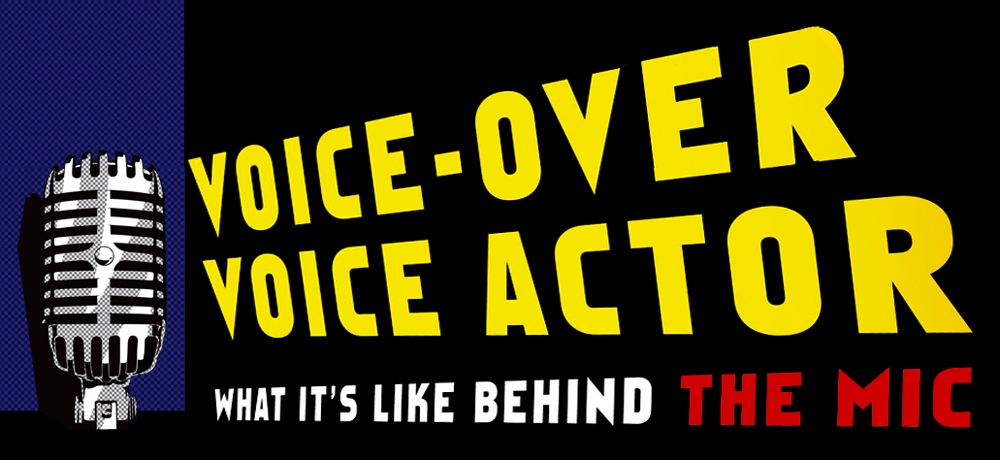PeanutButterStoryTime
Yuri and Tara are making use of their reading skills and hosting a fun weekly bedtime story show on Unlocked called PeanutButterStoryTime. Join them Tuesday nights 8p PST on Unlocked

A Peek Into The Secret World Of The Voice Actor
Interested in pursuing a career in VO? Curious what goes on behind the scenes in a business where people talk funny for money? This book offers a fun and comprehensive look at what it takes, what goes on and what it’s like behind the mic from two working pros who started from scratch.
Yuri and Tara are making use of their reading skills and hosting a fun weekly bedtime story show on Unlocked called PeanutButterStoryTime. Join them Tuesday nights 8p PST on Unlocked
So, I've been doing a lot of really long industrial narration sessions lately. This means pages and pages of technical, verbose writing and lots of talking, talking, talking. I've noticed that with these sessions, since I have elected to sit down to maintain a consistent level of energy throughout, I've gotten really yawn-y. Now at first I assumed that I was yawning cause I'm sitting in a dark-ish booth, droning on and on about a fairly dry subject, and maybe haven't gotten as much sleep the night before as I might have liked. So I started getting curious, and experimenting with switching the time of day the sessions were scheduled. I would do them first thing in the morning, in the middle of the day and even late in the afternoon, all with the same result. About 30 pages in, and I just start yawning away.
Then I realized, you don't just yawn when you're sleepy, yawning is a natural reflex when you aren't getting enough oxygen. Voila! I've started to focus on deeper sustaining breaths and the problem has drastically reduced. I mean after an hour and a half, 100 pages into a long narration, you're bound to have your brain a little muddled, but maintaining strong diaphramatic breathing has made all the difference. Corporate dialogue here I come!
We stress the importance of reading out loud. It may seem simple, and maybe you haven’t done it in years, but it can be hugely effective in improving everything from your acting to your ability to quickly assess a script, make choices, and pull the words off the page. Sir Ian McKellen claims that reading out loud was how he learned to act, and I think most of us will agree that he knows his stuff in that area. So, good enough for Sir Ian, good enough for us. Here’s a simple exercise you can almost anywhere and on your own time: Pick three things to read. Any bit of written media will work. Start small if you want. A pamphlet, a matchbook, a newspaper article, a newspaper ad, a comic book, a shopping list, someone’s blog, anything. Over the course of the day, collect those three things. Now-- and this is where it gets tricky –read them. Out loud.
Read each one at least once through, and if you’ve got time and you’re enjoying yourself, read them through again. See if each time through differs for you. See how the writings may be different from each other. Is one a story? Is one just trying to sell a product? Is one using a story to try and sell a product? Is one just a list of numbers on a receipt? If you’re having fun, give a different “character” to each one, or even switch it up within the writings.
You may not feel a change after doing this exercise, but trust us, it gets your brain and mouth working in all the right ways. Most importantly, as long as you’re reading out loud there is no wrong way to do this exercise. Unless of course you’re a monk who had, until this exercise, taken a vow of silence. Or if you’re in a library where they frown on doing anything out loud.
Have fun!
(Exercises re-published with permission from VoiceOverVoiceActor.com) Flip channels on your television or radio for 5 minutes to listen to commercials. Each time you find a commercial, try parroting the voice actor who is speaking. Try to repeat not only the words, but the musicality, the nuances, the tone, and the inflections.
Then turn off the radio or TV and pick up a random piece of text (it can be an advertisement in a magazine, a book, a piece of mail, etc). Try to use the same vocal patterns, tonality and style you were just mimicking as you read this new material.
Practicing this will begin to train your ear, attune you to what is currently "hot" in the advertising world, and get you reading and speaking aloud, which is important in and of itself.